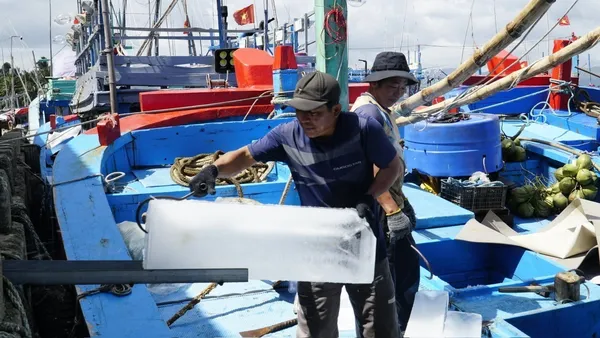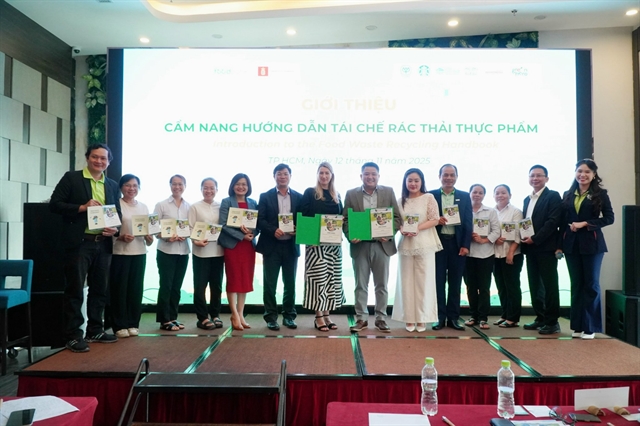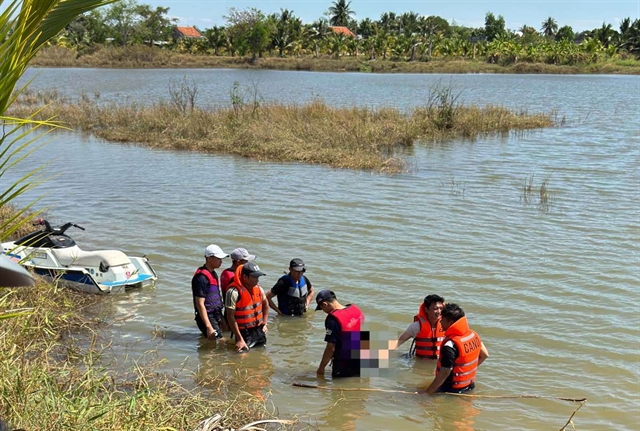 Society
Society


|
| The Food Waste Recycling Handbook was officially launched in HCM City on November 12 to promote green transformation and circular economy practices in Việt Nam. — Photo courtesy of the organisers |
HCM CITY — The Food Waste Recycling Handbook was officially launched in HCM City on Wednesday (November 12) to promote green transformation and circular economy practices in Việt Nam.
The launch event was organised by the Việt Nam Food Bank Network (VFBN), in collaboration with the Embassy of Denmark in Việt Nam and the Danish Veterinary and Food Administration (DVFA).
The publication represents a significant step toward reducing food waste and greenhouse gas emissions, while advancing Việt Nam’s commitment to the United Nations Sustainable Development Goals (SDGs) and its net-zero emissions target by 2050.
Nguyễn Tuấn Khởi, founding president of VFBN, emphasised that big change begins with small actions.
“This handbook not only provides practical steps but also inspires everyone to become a ‘Green Hero’ – working together to build communities free from food waste,” he said.
It is an educational journey where each person can start with simple habits – sorting waste at source, saving food, and recycling discarded food –to protect the planet and foster social responsibility.
According to the Food and Agriculture Organisation (FAO), one-third of all food produced globally – about 1.3 billion tonnes – is lost or wasted each year.
In Việt Nam, food waste has become an increasing concern, especially in urban areas and industrial zones, putting pressure on the environment and waste management systems.
To help address this challenge, the Food Waste Recycling Guidebook – A Pathway to a Greener Future was developed to support households, schools, businesses, and communities in sorting, reusing, and recycling food waste safely and effectively.
Drawing from Denmark’s advanced experience and international best practices in waste management and green innovation, the guidebook has been adapted to suit Việt Nam’s local context.
The handbook includes practical tools, visuals, and community communication resources. It features five chapters covering understanding food waste challenges and opportunities; sorting surplus and discarded food items; methods for reusing and recycling food waste; best practices from the Việt Nam Food Bank Network; and templates, diagrammes, and communication guidelines for community engagement.
The publication aims to empower communities to transform waste into valuable resources and help reduce methane (CH₄) emissions –one of the main drivers of climate change.
Sanne Høj Andrén, counsellor for Food and Agriculture at the Embassy of Denmark in Việt Nam, said Denmark and Việt Nam share a strong commitment to sustainable development.
“We are proud to partner with VFBN on this project to share knowledge and best practices in food waste management, inspiring positive change from the community level,” she said.
The handbook is part of VFBN’s broader campaign, “Green Việt Nam – No Food Waste,” which seeks to raise environmental awareness and promote sustainable consumption habits nationwide.
Through its community-based initiatives, VFBN has implemented several innovative models, such as collecting and recycling organic by-products like coffee grounds and fruit peels into compost for community gardens; partnering with universities to establish “Student Sharing Kitchens” where students practice waste sorting and composting; and connecting farms and businesses through the “From Farm to Food Bank” initiative to rescue surplus produce and recycle agricultural by-products.
These activities underline VFBN’s pioneering role in connecting enterprises, social organisations, local authorities, and citizens to jointly build a circular economy that supports both environmental protection and food security.
The launch of the handbook also reflects the shared commitment of Việt Nam and Denmark to advance green growth and practical community action for a cleaner, more sustainable future.
This initiative contributes to several UN SDGs, including those on poverty reduction, responsible consumption and production, climate action, and partnerships for sustainable development.
It is part of the Việt Nam–Denmark Green Strategic Partnership (GSP), signed in November 2023, which strengthens bilateral cooperation in green transition, renewable energy, and sustainable waste management.
In June 2024, the two sides announced a joint action plan for the 2024–25 period, focusing on practical solutions to support Việt Nam’s transition to a low-emission and circular economy. — VNS




